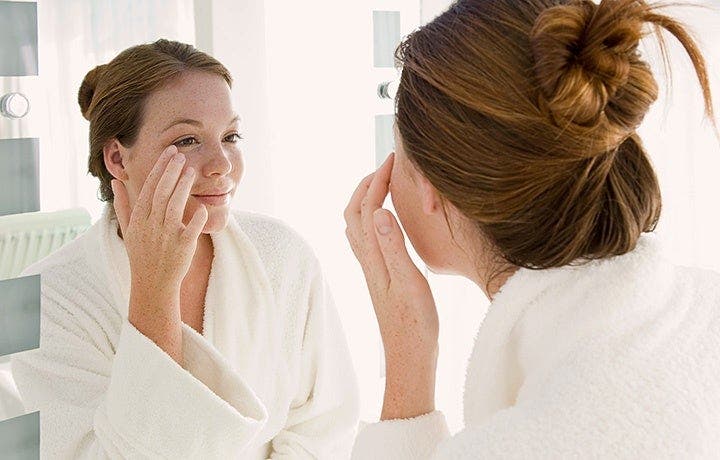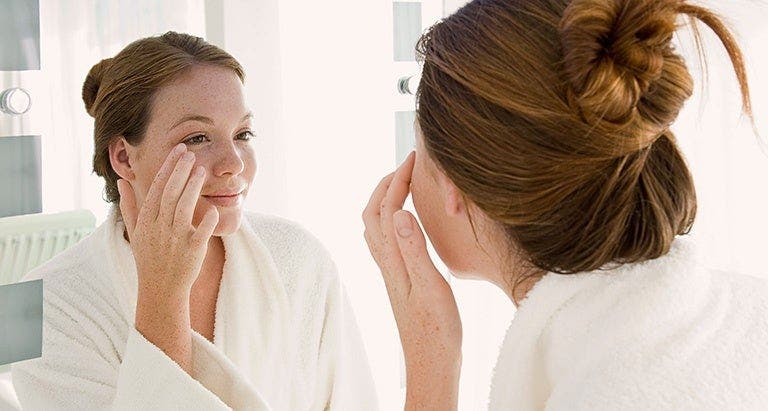Should you do a skin fast?


There’s no question—not having to apply makeup and skin-care products would be great for your morning schedule. But would it do anything for your skin?
Not much, according to Carolyn Jacob, MD, a clinical instructor of dermatology at Northwestern Feinberg School of Medicine in Chicago. She sees no reason to take a break from skin products, even makeup, for any length of time. “Doing nothing to your skin gives you no benefit,” Jacob explains.
But wait—isn’t makeup bad for skin?
The impression that makeup is harmful—leading to clogged pores and therefore pimples—is false, according to Dr. Jacob. Almost all makeup, no matter the price point, is noncomedogenic, meaning it doesn’t clog pores. After all, it’s in cosmetics companies’ interest to formulate their products this way, she explains. “No one wants to buy a makeup that’s going to make them break out with acne.” So she suggests reading labels and look for noncomedogenic makeup. Also, keep in mind that stage makeup can make a person break out.
Makeup sits on the surface of the skin, and can provide a protective barrier of sorts. Environmental elements such as air pollution, cigarette smoke, and ultraviolet light can create free radicals on the skin, causing sun damage, pigmentation, and wrinkles, according to Diane Berson, MD, a voluntary faculty member in the department of dermatology at Weill Cornell Medicine in New York City.
If you do wear makeup, it’s essential to remove it each night so your skin’s natural turnover of oil and dead skin cells isn’t impeded.
When a skin fast might help
If you’re dealing with a specific skin issue, such as breakouts, a rash, irritation, dry skin, flakiness, or redness, Dr. Jacob acknowledges that there could be a benefit to cutting out a portion of your current routine. A particular active ingredient in one product could be to blame, so eliminating (and later reincorporating) the product could help determine if that’s the case. Common culprits for causing reactions are over-the-counter acne medications and pore refiners, Dr. Jacob says. These contain salicylic acid or benzoyl peroxide, which can be harsh and drying.
If you want to try a limited fast, Dr. Berson suggests taking one week off from the product, then applying it again for three days straight to see if it has the same effect. “It’s giving your skin a chance to rebound and for the irritation to go away,” she says.
What not to cut out
As you experiment with your routine, Jacob recommends keeping a regimen of cleansing, moisturising, and using sunscreen at the very least.
Here’s what an essential skin-care routine looks like:
Sunscreen. “If you’re going to do one thing, wear sunscreen every single day,” Dr. Jacob says. “If you’re outdoors, reapply it every 90 minutes, and we recommend an SPF of 30 or higher.” Dr. Berson agrees, noting that she wears sunscreen even on days she’s home. “Ultraviolet light is everywhere, and it goes through windows and glass,” she warns.
Cleanser. Washing your face every day is another high priority for skin health, says Dr. Jacob. “Your dead skin cells will build up on top of each other and give you a dull appearance if you’re not washing appropriately,” she says.
Moisturiser. Even with three small children at home, Dr. Jacob makes time to apply moisturiser (hers contains sunscreen, antioxidants, and skin growth factors, all in one).
Regular dermatologist visits. You should see a Board Certified Dermatologist annually for a full skin check for skin cancers. And Dr. Berson suggests also seeing a dermatologist once or twice a year for skin care help. A dermatologist helps you develop the most effective, streamlined skin routine possible. By determining your skin type, he or she can tell you which products to keep and which to chuck (or use less often). If you don’t wear makeup, a dermatologist can clue you in on procedures such as peels and light laser treatments that can make your skin look as healthy and glowing as possible without cosmetics.
The bottom line: writing off all skin products sounds appealing but won’t accomplish much, the experts say. Instead, try decreasing or changing up what you’re doing, as long as you don’t discard the basics — cleansing and using a moisturiser with sunscreen.
And if you’re set on purging things from your life for the sake of your skin, Dr. Jacob has the best idea of all: stage a lifetime “fast” from tanning beds since they can increase your chance of developing melanoma by 75 percent.
